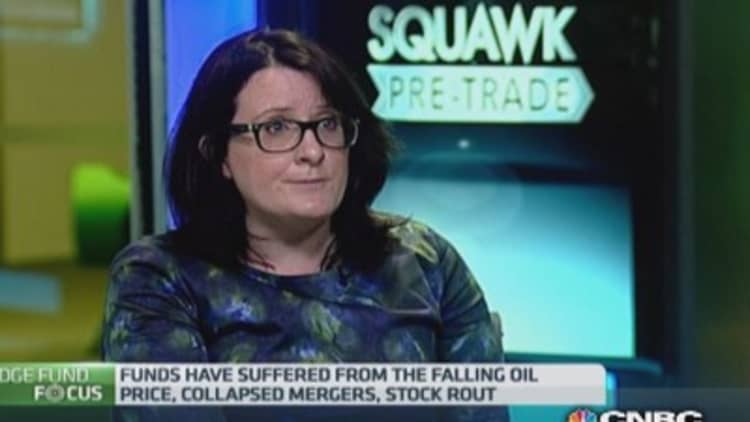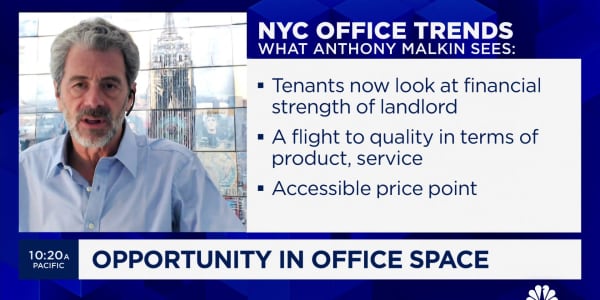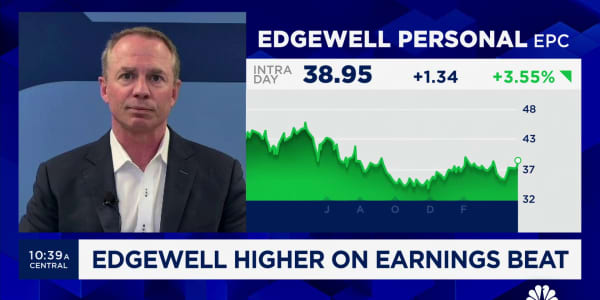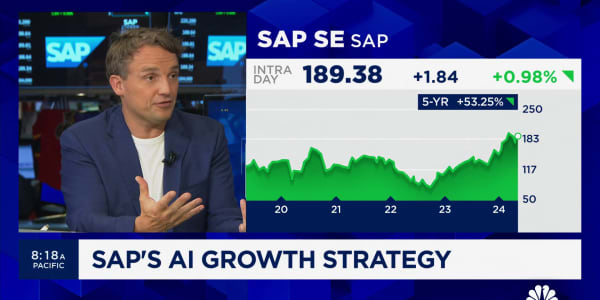Hedge funds designed to protect against falling and volatile markets have made a strong pitch to investors: Trust us with your money, and we'll make lots of it for you when years of relatively smooth, positive stock returns inevitably end.
The beginning of the end—or at least a temporary market pullback, depending on whom you ask—finally came in October and market gyrations increased. The is down nearly 3.5 percent and the , or VIX, is up nearly 14 percent for the month as of Monday.
But short-selling experts, volatility arbitrage specialists, macroeconomic forecasters and other funds designed to profit from choppy or down markets have mostly underwhelmed in October, according to early performance estimates obtained by CNBC.com.
"It's brutal," said a frustrated hedge fund researcher at a money management firm for wealthy families who asked not to be named. "So far I'm not really impressed by anybody."
Read MoreTime for insurance on an 'unsustainable' market?
Take volatility arbitrage funds, for example. As their strategy name suggests, they are supposed to profit when the market swings up and down, just like it's done in October.
But many funds appear to have faltered, including the BlueMountain Equity Alternatives Fund (down 0.64 percent for the month through Oct. 10 and 2.68 percent for the year); Capstone Vol Offshore (about flat through Oct. 10 and up 0.60 percent in 2014); and Dominicé & Co.'s Cassiopeia Fund (up just 0.03 percent through Oct. 10 and down 3.80 percent in 2014).
Spokesmen for BlueMountain and Capstone declined to comment. Dominicé did not respond to a request for comment.
Another strategy that has underperformed so far this month is market neutral, which seek to evenly weight bets for and against the value of stocks and often attract managers with a knack for short-selling. Despite their reputation as a better protector of capital in down markets, such funds are up just 0.27 percent through Oct. 15, according to a Bank of America Merrill Lynch report.
Examples include Carlson Capital's Black Diamond Relative Value Fund (down 1.11 percent for the month through Oct. 10 and up 3.41 percent in 2014), according to a report from HSBC's alternative investment group, and the Marshall Wace TOPS UCITS fund (down 0.09 percent through Oct. 16 and up 1.51 percent for the year), according to firm materials. Both firms didn't respond to requests for comment.
Even if some shorts have worked for market-neutral managers, they appear to have been outweighed by losing longs.
"Unfortunately I am getting whacked in October like everyone else," said Scott Fearon, founder of $100 million Crown Capital Management.
Fearon—a previously reclusive manager who recently stepped into the public eye for the first time by publishing a book on shorting overvalued stocks—said his fund is down about 2 percent this month. Crown's shorts are up, but they have been outweighed by losing longs such as manufacturing company Trinity Industries, which was hurt by a selloff of energy sector companies.
Fearon's fund is still slightly positive for the year and has produced annualized returns of 11.4 percent net of fees from 1991 to 2013. Today, he's still convinced some parts of the market are overvalued.
"On a (price-to-earnings) basis the is roughly fairly valued," Fearon said. "But there is a glaring bubble in some sectors, including social media, biotech and alternative energy."

A third type of hedge fund hit hard in October has been "macro" funds, or those that bet on broad macroeconomic trends. The strategy had its best performance in four years in September as interest rates rose slightly and the U.S. dollar appreciated against many foreign currencies.
Read More'Perfect storm' benefits macro hedge funders
But October meant a reversion to losses for some of the biggest funds in the industry.
Examples include Tudor Investment's Tudor BVI Global Fund (down 1.96 percent through Oct. 10 and 0.85 percent for 2014); Discovery Global Opportunity Fund (down 6.96 percent through Oct. 10 and 13.29 percent for the year); Caxton Global Investment (down 2.34 percent through Oct. 14 and 4.65 percent for 2014); and the Fortress Macro (down 3.16 percent through Oct. 10 and 7.98 percent for the year).
Spokesmen for Tudor and Discovery declined to comment; Caxton and Fortress didn't respond to requests for comment.
October has been a bad month overall for hedge funds, continuing a year of mediocre performance. Stock-focused funds are down 3.59 percent through Oct. 15, according to BofAML. The popular "event-driven" strategy, which focuses on corporate shakeups, is down 6.26 percent. The average across all strategies is a 3.4 percent loss.
To be sure, there are some examples of money makers among strategies designed to do well in a down market.
Funds that focus on trading futures contracts, commodity trading advisors, have done particularly well. Examples include the AHL Diversified fund—the Man Group's flagship—which is up 0.91 percent for the month through Oct. 17 and 19.69 percent for the year. Another is the Winton Futures Fund, up 2.45 percent through Oct. 15 and 4.44 percent in 2014. The avergage CTA fund is up 0.64 percent through Oct. 15, according to BofAML.
Winton declined to comment and AHL did not respond to a request for comment.
The strategy that should perform best in a market correction, shorting-focused funds, has few participants. One of those left, Dave Davidson's $5 million Shoreline, is up 6 percent in October as of Monday on winning shorts like Netflix, Baker Hughes and Caterpillar.
Davidson thinks the market could eventually drop 50 percent from its highs in September.
"The grand experiment of the Fed printing money is finally coming home to roost," said Davidson. "This is the grandest bubble of them all."






